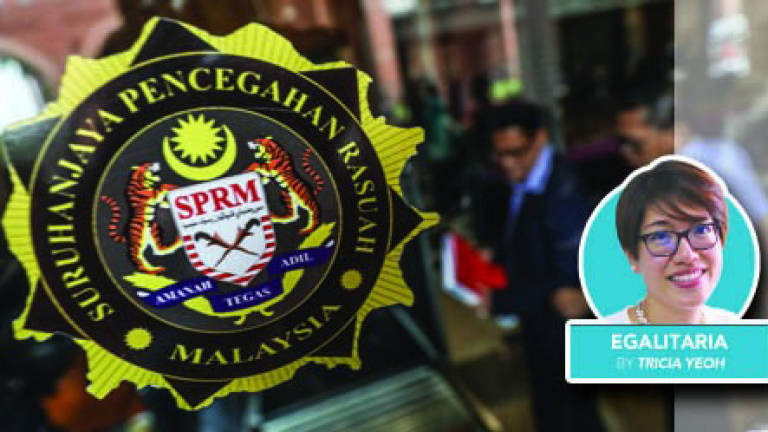Our record under review

NOT many Malaysians are aware that we are a signatory to the United Nations Convention Against Corruption (UNCAC), the first globally binding international anti-corruption instrument. The treaty requires its member countries to implement anti-corruption measures which may affect their laws, institutions and practices, based on a set of international standards.
These measures aim generally at preventing corruption, facilitating international cooperation including asset recovery and promoting accountability and proper management of public property, including domestic and foreign bribery, embezzlement, trading in influence and money laundering.
Malaysia signed the UNCAC in December 2003 during former Prime Minister Ahmad Abdullah Badawi’s tenure, but only ratified the agreement in September 2008.
I recall attending the civil society meetings on the sidelines of the UNCAC conference taking place in Bali in 2007, where Malaysia was only given observer status at the time – there was a sense of anticipation among the Malaysian Anti-Corruption Commission (MACC) officials that we would be a full member state soon and therefore commit to all the international obligations under the treaty.
Nine years in, how is our performance today?
As far as corruption perception is concerned, not very well. Malaysia fell yet again in the most recent Transparency International Corruption Perception Index 2016, dropping in rank from 54 out of 168 countries (scoring 50 out of 100) in 2015 to now ranking 55 out of 176 countries (scoring 49 out of 100). Transparency International’s other survey, the Global Corruption Barometer, saw 60% of Malaysian respondents saying that the level of corruption had increased, while 53% felt the government was ineffective in handling the fight against corruption.
But surveys are surveys – a perception measurement tool. A more accurate representation of whether a country’s laws and policies are up to par, including in its application of them in reality, may be to compare against an international instrument such as the UNCAC.
This year, Malaysia is being reviewed by international experts appointed by the UN Office of Drugs and Crime (UNODC, under which the UNCAC is administered) on how far it complies with two particular sections under the treaty, namely the chapters on prevention and asset recovery.
The process review can be rather complicated, but in short: MACC being the appointed agency by the government conducts a self-review, and also compiles feedback from relevant third parties (like government agencies, statutory bodies or external entities) depending on the nature of the article that is under review. The feedback is then submitted to the international reviewers, who provide their own comments, questions and remarks. More comments are given by the stakeholders. Finally, a panel of international reviewers conducts a series of consultations through country visits.
This time, the MACC invited several civil society organisations that work on governance and anti-corruption issues to provide responses on one of the UNCAC articles, namely that on how society participates in the efforts to combat corruption in Malaysia.
It is a positive sign that external stakeholders are being brought in to provide honest feedback and it is hoped that this partnership can be a continued one, since combating corruption does require concerted effort from all parts of society.
While a review process is important, what is even more imperative is for the host country to be open in receiving these comments – with the ultimate goal of improving the anti-corruption institutions, laws and policies that govern us. In fact, it is hoped that MACC and the government will receive the final review report and its accompanying recommendations, and make it available for public viewing.
For instance, as stated above, one of the chapters under review is “asset recovery”, which is aimed at returning assets to their rightful owners, including countries from which they had been taken illicitly.
This is an interesting coincidence, given that the US Department of Justice is actively seeking at present to recover more than US$1 billion in assets, which it says are associated “with an international conspiracy to launder funds misappropriated” from a strategic development company.
The response from the Malaysian authorities has been unsurprising, but nevertheless thoroughly disappointing. Despite MACC’s best efforts at fighting corruption, this will be undermined by a lacklustre and regressive mindset from among their government department counterparts.
What this means is simple: even with the best laws and policies set up, this matters little if the implementation is left severely wanting.
Although many do criticise the UN and its various agencies and treaties as moving much, much too slowly for significant progress to be made, there is certainly some value to be had. In our country’s case, for instance, this year’s country review report and recommendations will be extremely useful for civil society and independent academics to see how far Malaysia falls short by international standards.
Civil society can also learn from the successes of other countries’ civil society organisations in how they placed pressure on their governments when it came to corruption at the highest levels. For example, one strategic partnership that would be most useful to Malaysia would be the joint World Bank and UNODC Stolen Asset Recovery Initiative. Apart from these, there are numerous manuals, tools and training materials available on the website, freely accessible for anyone interested in training younger Malaysians on the importance – and the how-to – of fighting corruption.
This column has stated, and I now reiterate, that public administration corruption ultimately leads to a reduction in the amount of public funds available for developing the country (think: better quality education and healthcare). That should be the real reason anyone cares.
Anti-corruption work is long and laborious, but it deserves better attention – and perhaps learning how Malaysia’s record stands based on this year’s UNCAC review is another step in the right direction.
Comments: letters@thesundaily.com